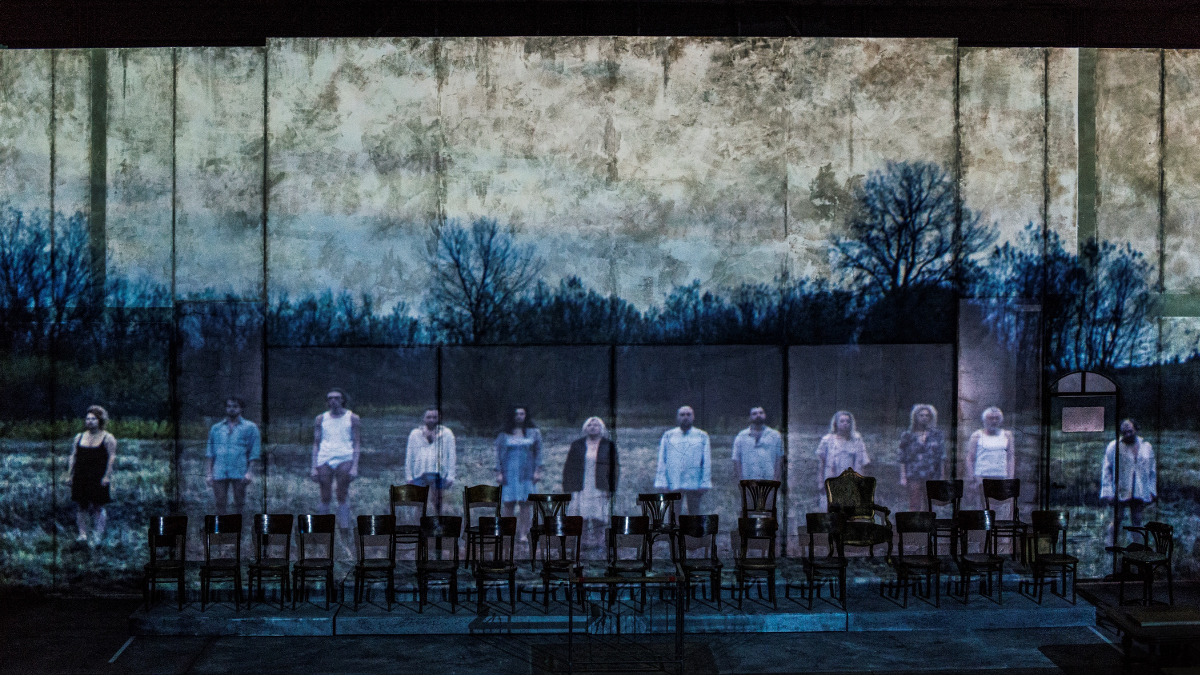with
Bożena Baranowska
Maciej Charyton
Małgorzata Gorol
Anna Ilczuk
Mikołaj Jodliński
Andrzej Kłak
Dariusz Maj
Michał Opaliński
Marcin Pempuś
Halina Rasiakówna
Piotr Skiba
Ewa Skibińska
Adam Szczyszczaj
Andrzej Szeremeta
Wojciech Ziemiański
Marta Zięba
Ewelina Żak
Krystian Lupa’s decision to tackle the work of Kafka sees a return to his dialogue with modernity’s great spiritual observers. His brand of theatre stems from a unique encounter: a troupe of performers commit themselves, heart and soul, to a period of research lasting several months or more. In the resulting shows, which draw upon novels of monumental stature, the notion of time is stretched and condensed, producing instants of near-hypnotic intensity. But was Lupa in any doubt as to just how much this work might echo present circumstances? Bringing almost twenty performers to the stage, the coming to fruition of this ambitious show, which also draws upon Kafka’s correspondences and his Diaries, proved to be a particularly difficult one. The political situation in Poland forced Lupa to suspend rehearsals for a long period of time. The destiny of Joseph K., and his “unequal struggle with the Unknown” must have seemed “strangely close to the absurdities and dialogues of our current day reality in Poland”. However, the international support given to him by numerous theatres, particularly in France, allowed him to go ahead with his project. Besides, the urgency of the message and the far-reaching resonances of this Trial extends far beyond national frontiers : “faced with this crisis of European values”, concludes Lupa, “and the threat posed to individual freedom, we want this performance to be a common voice for the future.”
Cast
translation Jakub Ekier
adaptation, scenography, lights Krystian Lupa
costumes Piotr Skiba
music Bogumił Misala
video, collaboration to the light Bartosz Nalazek
animations Kamil Polak
make-up / hairdressing Monika Kaleta
main production Nowy Teatr – Varsovie
production STUDIO teatrgaleria, Teatr Powszechny, TR Warszawa – Varsovie, Le Quai – Centre Dramatique National des Pays de la Loire
coproduction Odéon-Théâtre de l’Europe, Festival d’Automne à Paris, Kunstenfestivaldesarts – Bruxelles, Printemps des comédiens – Montpellier, La Filature, Scène nationale – Mulhouse, Théâtre du Nord – Lille, La rose des vents – Scène nationale Lille Métropole Villeneuve- d’Ascq, HELLERAU – Europäisches Zentrum der Künste Dresden, Centre culturel Onassis – Athènes en partenariat avec le Teatr Polski w Podziemiu – Wroclaw
with the support of the city of Warsaw (Miasto Stołeczne Warszawa), of the Adam Mickiewicz Institut, of the Adami
with the Festival d’Automne à Paris
---------
with the support of the Cercle Giorgio Strehler
Director
Krystian Lupa was born in 1943 in Jastrzębie Zdrój, Poland. After studying at the Academy of Fine Arts in Kraków and the Łodź Film School he entered the National Theatre School in Kraków where he studied directing. His theatrical career began in 1976. After working at the Theatre of Jelenia Góra, he collaborated with Teatr Stary in Kraków, Teatr Dramatyczny in Warsaw and Teatr Polski in Wrocław, while teaching since 1983 at the faculty of directing at The National Theatre College in Kraków. Influenced by Tadeusz Kantor (his "master", along with the filmmaker Andrei Tarkovski) and a great reader of Jung, he developed his conception of theatre as an instrument for exploring and transgressing the boundaries of individuality (set out in a text entitled The Theatre of Revelation). He first staged the great Polish playwrights of the 20th century: Witkiewicz (Les Mignons et les Guenons, 1977), Gombrowicz (Yvonne, Princesse de Bourgogne, 1978, Le Mariage, 1984), Wyspianski (Le Retour d'Ulysse, 1981), and conceived two shows in their entirety: La Chambre transparente (1979) and Le Dîner (1980). In 1985, he created City of Dreams at the Stary Teatr based on Alfred Kubin's novel (The Other Side). In addition to directing dramatic works, Chekhov (The Three Sisters, Festival d'Automne, 1988), Reza (Art, 1997), Schwab (The Presidents, 1999), Loher (Claire's Relationships, 2003), fictional literature, particularly Austrian, became his favourite material. He adapted and directed Musil (The Dreamers, 1988), Dostoyevsky (The Brothers Karamazov, 1990), Rilke (Malta or the Triptych of the Prodigal Son, 1991), Bernhard (Kalkwerk/La Plâtrière, 1992; Emmanuel Kant et Déjeuner chez Wittgenstein, 1996; Auslöschung-Extinction, 2001), Broch (Les Somnambules, 1995, Festival d'Automne à Paris, 1998), Bulgakov (Le Maître et Marguerite, 2002), Nietzsche and E. Schleef (Zarathustra, 2006).
Krystian Lupa is a leading figure on the contemporary European stage and a Polish director, author, set designer and lighting designer. Inspired by the director Tadeusz Kantor and the filmmaker Andrei Tarkovsky, his theatre places the actor's work at the centre of the creative process. In a tension between the figurative and the unreal, the concrete and the mental, it is marked by a troubled realism, as if perceived through the shades of the imaginary and the unconscious.
As a complete theatre maker, he has established himself as a designer of adaptations, a visual artist (he himself designs the sets and lighting for his shows) and a director of actors (known for his long preparatory work with the actors on the construction of the characters). His shows are also marked by a singular work on rhythm, slowed down time in the unfolding of the stage action, often concentrated around moments of crisis.
His work has received numerous awards, including the Europe Prize for Theatre (2009). Following Factory 2, he created Persona Marilyn and Le corps de Simone (two parts of a project based on the figures of Marilyn Monroe and Simone Weil); Salle d'attente, based on Norén's Category 3.1 (2011). By Thomas Bernhard, he adapted Perturbation (2013), Des arbres à abattre (2014) and Place des héros (2015).
At the Odéon:
- Les Somnambules by Hermann Broch, 1998
- The Brothers Karamazov by Dostoyevsky, 2000
- Auslöschung / Extinction based from Thomas Bernhard, 2002
- Mistrz i Malgorzata [The Master and Margarita], by Bulgakov, 2003
- Rodzenstwo: Ritter, Dene, Voss [Lunch at Wittgenstein] by Thomas Bernhard, 2004
- Zaratustra, based from Friedrich Nietzsche's Thus Spoke Zarathustra and Nietzsche. Trilogy by Einar Schleef, 2007
- Wycinka Holzfällen [Trees to cut down], by Thomas Bernhard, 2016
- Proces [The Trial], based from Franz Kafka, 2018
- The Emigrants, based from W. G. Sebald, 2024
Practical Information
Length: about 4h30, with two intervals
19h Tuesday to Saturday, 15h on Sunday




